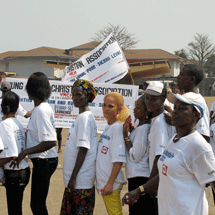By Benjamin Bradlow, SDI secretariat

|
| The launch of the Sierra Leone Federation of the Urban and Rural Poor, 16 Feb. 2011. Photo: Shack/Slum Dwellers International |
[17 March 2011] -- After three years of mobilising savings groups, fighting evictions, and building links with government, the Sierra Leone Federation of the Urban and Rural Poor (FEDURP-SL) officially launched on 16 February.
The ceremony was attended by approximately 400 members of the Federation from four cities: Freetown, Bo, Makeni, and Kenema.
The launching ceremony, which was attended by the Minister of Land, Minister of Local Government, Deputy Minister of Justice, representatives of the mayor of Freetown, and Bowenson Philips, the Chief Administrator of Freetown.
The Federation now numbers about 1, 500 in total, with most of the membership based in Freetown. The ceremony was chaired by the Chief Administrator of the City of Freetown, Bowenson Philips. Federation members spoke about the value of the Federation and the Fordibambai Trust Fund — the Sierra Leone Federation’s urban poor fund — to attract funding for the projects of the poor.
A representative of the mayor also spoke regarding the issue of the settlement of Kroo Bay in Freetown, which has faced many eviction threats in the last five years. He noted that the mayor recognizes the Community Steering Group, the informal leadership organisation of the large, historic settlement, and that the solutions for the flooding, overcrowding and land use issues in Kroo Bay lie in the hands of the residents of Kroo Bay. This is a far cry from our experience with representatives of the Mayor last year, when we were told that the Mayor reserved the right to evict the residents basically at will.
The next day, on 17 February, the Federation held its first national strategic meeting. In attendances were representatives from about 30-40 communities in the four cities. Some of the savings schemes in places like Kroo Bay and Dworzack (both in Freetown) were three years old. Some of the savings schemes from cities like Bo, Makeni, and Kenema, were only a few months or weeks old.
To begin with, the Federation reported on existing successes and challenges. Successes include the fact that regular meetings are taking place, local authorities are interested in the work of the Federation, and interest is being paid on the loans that have been issued within the groups and settlement-level networks. Challenges include some issues with poor loan management, and distrust of the Federation due to prior history that communities have with NGOs.
The Federation is planning to develop stronger settlement-level network structures, as well as to consolidate this at the city and national level. It is hoped that stronger leadership structures and ownership of strategic vision will help the Federation to solve some of these challenges, and establish successful precedents to be shared through exchanges.
The roots of the Fordibambai Trust Fund lie in the experience of exchanges undertaken by the Federation, particularly to the East African countries. These exchanges have clearly been a powerful experience, even though only a few members have actually gone on the trips. Federation songs mention by name every country to which the Federation has visited (Kenya, Uganda, Tanzania, Brazil), and they know the slogans from each country’s respective federation. Each member will have to make a monthly contribution to the Fordibambai Trust Fund. Regular loaning is to be strengthened through the creation of a guarantor for each loan, and a loan management committee within each settlement-level network.
The Federation also discussed the role of the settlement-level networks. They are to pursue activities such as profiling and enumeration, loan committees, mobilisation, and savings.
Sierra Leone is probably the second strongest SDI-affiliated initiative in the West African region after Ghana. The launching of the Federation and its overall growth is leading the hub to believe that it is ready to assert more autonomy from the support of the East African hub. The West African hub plans to hold its first separate hub meeting later this year, which will also include initiatives from Liberia and Nigeria.
Felicia Amanor, a leader of the Ghanaian Federation and one of the original mobilisers of the Federation in Sierra Leone, gave powerful challenges to the Federation during the strategic meeting. She suggested that the Federation is not growing fast enough. Further to this, she encouraged a greater spirit of voluntarism within the Federation. It was important, she said, to see the Federation as a process and much more than the sum of its projects. Therefore, the outlook must be not just for the current membership, but also for the whole community, the whole country, and even the whole West African region.
This article was first published on the SDI website 15 March 2011 as "Sierra Leonean Federation Launches".




